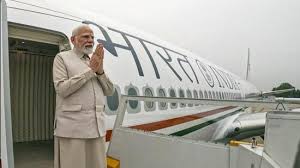Narendra Modi says UK visit aimed at prosperity, job creation, growth

London, July 24, 2025 – Prime Minister Narendra Modi reached the United Kingdom for a crucial two-day visit, focusing on prosperity, job creation, and economic growth. His visit marks a key moment in strengthening India–UK ties. Before departing, Modi said, “This trip is about creating opportunities and driving future prosperity for both nations.”
Historic Trade Deal Signed
The central highlight of the visit is the India–UK Free Trade Agreement (FTA), signed on July 24 in London. After two years of negotiations, the deal finally came through. It cuts tariffs on 99% of Indian exports and 90% of UK exports.
Indian businesses will now find it easier to export products like textiles, leather goods, jewelry, and processed foods. British industries will benefit from lower duties on items like whiskey, premium cars, and healthcare products.
Indian exporters, especially small businesses, are expected to see new growth opportunities. British companies also see this deal as a major post-Brexit achievement.
Boosting Trade and Jobs
Bilateral trade between the two countries crossed $55 billion in 2023–24. Both sides aim to double this figure by 2030, targeting $120 billion. This deal creates a solid foundation for that goal.
Indian sectors like apparel, electronics, auto components, and food processing stand to gain. These industries could generate thousands of new jobs. British exports, especially in manufacturing and premium goods, will also grow in the Indian market.
Rakesh Verma, a textile exporter from Gujarat, said, “We can now enter the UK market without worrying about high tariffs. This will help small exporters like us thrive.”
Stronger Strategic Partnership
Modi met UK Prime Minister Keir Starmer, King Charles III, and leading business figures during the visit. The two leaders launched a new India–UK Innovation and Technology Bridge. This initiative will connect startups and promote collaboration in clean energy, AI, and biotech.
They also introduced a Green Growth Fund to support climate projects. It will fund sustainability initiatives in both countries, aligned with the Paris Agreement.
In education, Indian and UK universities signed several agreements. These will enable student exchanges, joint research, and degree recognition. More Indian students will now have access to UK institutions at reduced costs.
Easier Mobility for Indian Talent
The FTA includes significant steps for professional mobility. Under the deal, up to 1,800 Indian professionals will receive work visas each year. These visas cover key sectors like IT, engineering, and healthcare.
Companies transferring employees for short-term work will now avoid double social security payments. This lowers costs and encourages more talent exchange between both countries.
This move benefits young Indian professionals and helps the UK fill skill shortages in high-demand sectors.
A Shared Global Vision
Modi and Starmer also discussed international cooperation. They pledged to work together on global challenges such as digital governance, cybersecurity, food security, and climate change.
The two leaders agreed to coordinate at global forums like the G20, UN, and Commonwealth. They emphasized the need to uphold a rules-based global order and promote democratic values.
“India and the UK share a vision for a secure, inclusive, and prosperous world,” Modi said after the meeting.
Ties Beyond Politics
The Indian diaspora in the UK plays a major role in shaping relations. Over 1.7 million people of Indian origin live in the UK. Modi met community leaders, Indian-origin MPs, and business owners during his trip.
He called the diaspora a “living bridge” between the two nations. A cultural showcase followed his speech, featuring classical music, yoga, and Indian science exhibits.
These cultural and people-to-people ties continue to strengthen long-term cooperation.
Conclusion
PM Modi’s UK visit delivered more than just a trade agreement. It signaled India’s growing influence on the global stage and reaffirmed its partnership with a key ally.
The visit’s focus on jobs, trade, and strategic collaboration sets the tone for future growth. The India–UK partnership now stands on stronger ground, built on trust, shared values, and a common goal of prosperity.
As India moves toward becoming a $5 trillion economy, global deals like this one will shape its path forward.






